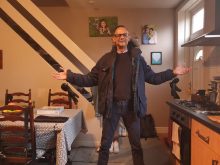 Three stories from the treatment agency West Glamorgan Council on Alcohol and Drug Abuse (WGCADA) in Swansea describe a medical student’s experiences during a day with community support worker Dave Watkins; a client’s experiences whilst interacting with Arrest Referral worker Becky Hancock, and a client’s experiences in the Primary treatment programme at WGCADA. (4,644 words)
Three stories from the treatment agency West Glamorgan Council on Alcohol and Drug Abuse (WGCADA) in Swansea describe a medical student’s experiences during a day with community support worker Dave Watkins; a client’s experiences whilst interacting with Arrest Referral worker Becky Hancock, and a client’s experiences in the Primary treatment programme at WGCADA. (4,644 words)
In the previous part of My Journey, I described some of what I learnt through a small group of practitioners (some of whom were in recovery) at the treatment agency WGCADA in Swansea. During my time at WGCADA, my colleagues and I wrote a number of stories, three of which I include here.
1. ’A Day in the Life of Dave’ by Annalie Clark
The first story is written by my daughter Annalie, after she finished her first year of medical training at the University of Edinburgh and worked as a volunteer for Wired In over a period of the summer. One of her projects involved following around WGCADA Community Support Worker Dave Watkins.


 Over the past decade, I’ve become increasingly interested in trauma and its consequences (e.g. addiction, mental health problems, suicide), and the healing of trauma. I described this increasing interest in a blog post last month entitled
Over the past decade, I’ve become increasingly interested in trauma and its consequences (e.g. addiction, mental health problems, suicide), and the healing of trauma. I described this increasing interest in a blog post last month entitled  Here is a powerful
Here is a powerful  Ellie’s Recovery Story is from the excellent
Ellie’s Recovery Story is from the excellent 
 I was going through some of my old blog posts and came across a 2014 post from one of my favourite people in the mental health field, award-winning psychiatrist Mark Ragins. I thought it was time to post it again. First a few words from Mark about himself which I consider particularly pertinent:
I was going through some of my old blog posts and came across a 2014 post from one of my favourite people in the mental health field, award-winning psychiatrist Mark Ragins. I thought it was time to post it again. First a few words from Mark about himself which I consider particularly pertinent: It is important to note the close similarity in the nature of elements that underlie recovery from serious substance use problems and recovery from mental health problems.
It is important to note the close similarity in the nature of elements that underlie recovery from serious substance use problems and recovery from mental health problems. I am pleased to announce the release of David Walker’s new book Coyote’s Swing, in which he condemns the U.S. mental health system’s partnership with the pharmaceutical industry and presents research on this system’s history of complicity with Native oppression.
I am pleased to announce the release of David Walker’s new book Coyote’s Swing, in which he condemns the U.S. mental health system’s partnership with the pharmaceutical industry and presents research on this system’s history of complicity with Native oppression. I’ve recently posted two blogs about Meghann Perry, the last one being
I’ve recently posted two blogs about Meghann Perry, the last one being  Huseyin Djemil
Huseyin Djemil

 One of my favourite bloggers has been Phil Valentine, Executive Director of the
One of my favourite bloggers has been Phil Valentine, Executive Director of the  During the many years I spent working in the addiction and mental health field, first as a neuroscientist and later (2000-2008) in the UK helping empower people to facilitate their recovery (healing), I rarely heard the word ‘trauma’ being used.
During the many years I spent working in the addiction and mental health field, first as a neuroscientist and later (2000-2008) in the UK helping empower people to facilitate their recovery (healing), I rarely heard the word ‘trauma’ being used. Here is the Forward of a book written by Perth Clinical Psychologist Bill Saunders,
Here is the Forward of a book written by Perth Clinical Psychologist Bill Saunders,  Here is another
Here is another 
